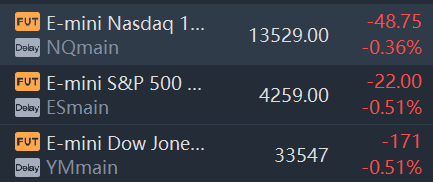U.S. stock index futures fell on Monday, taking cues from global markets, after weak economic data from China rekindled fears of an economic slowdown in the world's second-largest economy.
Market Snapshot
At 07:59 a.m. ET, Dow e-minis were down 171 points, or 0.51%, S&P 500 e-minis were down 22 points, or 0.51%, and Nasdaq 100 e-minis were down 48.75 points, or 0.36%.
Pre-Market Movers
Turquoise Hill Resources— Shares plunged 17% said as its special committee terminated the review and consideration of Rio Tinto Ltd's proposal to buy the rest 49% for $2.7 billion.
Poshmark— Shares spiked more than 5% after Barclays upgraded the online fashion retailer to overweight from equal weight. Poshmark will get a boost from the fast-growing second-hand clothing marketplace, especially if consumers trade down in a recession, Barclays said.
Vroom— Shares dropped more than 3% after JPMorgan downgraded the stockto underweight from neutral, saying that the online used car retailer will continue to see challenges amid a broader economic slowdown. Vroom has already plunged 80% this year.
Revolve— The stock fell more than 2% following a downgrade to underweight from equal weight from Barclays. The investment firm cited slowing revenue growth and tough comparisons at the clothing store company.
Green Plains— Green Plains declined more than 3% after Bank of America downgraded the stock to neutral from buy. The investment firm said the current valuation for the ethanol fuel producer is fair.
TaskUs— The outsourcing company for content moderation is facing near-term macro challenges, according to Morgan Stanley. The investment firm downgraded the stock to equal weight from overweight. Shares fell 3%.
Baidu,Alibaba,Pinduoduo— Shares of Chinese internet companies declined following weak economic data from China. Baidu, Alibaba and Pinduoduo each dropped more than 1%.
Comcast,Charter Communications— Shares of both broadband companies declined more than 1% following downgrades to neutral from Atlantic Equities. The firm cited worse-than-expected broadband results from both companies.
Dollar General— Shares of the discount retailer have fully priced in recession expectations, according to a Monday note from BMO Capital Markets. The firmdowngraded Dollar General to market performfrom outperform. The stock declined 1%.
Market News
Li Auto Stock Drops After Revenue Miss, Downbeat Outlook
Shares of Li Auto Inc. dropped 6.3% in premarket trading Monday, after the China-based electric vehicle maker reported a second-quarter net loss that nearly tripled, revenue that fell well short of expectations and provided a downbeat third-quarter outlook, citing "numerous pandemic-related challenges."
The net loss for the quarter to June 30 widened to RMB641.0 million ($95.7 million), or 64 cents per American depositary share, after a loss of RMB235.5 million, or 26 cents per ADS in the year-ago period.
Renaissance Boosts Holdings in Both NIO and XPeng By Over 200% in Q2
Renaissance increased its stake in NIO by 228.96 percent to 17,768,900 shares and XPeng by 256.81 percent to 3,620,600 shares in the second quarter.
Renaissance Technologies LLC, one of the world's most prominent hedge funds, increased its bets on Chinese electric vehicle companies in the second quarter, particularly for NIO and XPeng Motors.
Bitcoin Tops $25,000 for First Time Since June Amid Crypto Rally
Bitcoin briefly surpassed $25,000 for the first time since mid-June, as momentum continued from a cooler-than-expected US inflation data and progress toward Ethereum’s big upgrade.
The largest cryptocurrency rose as much as 2.2% on Sunday to $25,031, its highest level since June 13. It was trading around $24,750 as of 6 a.m. New York time, rising a fifth straight day in a streak fueled by US consumer-price index data that came in below expectations.
Affirm CEO Says Next Recession Will Silence Fintech Lender’s Doubters
Max Levchin says the market is wrong about Affirm Holdings Inc., the buy now, pay later company he co-founded a decade ago. It might just take a recession to prove it.
Affirm’s stock is down 77% since hitting its peak in November, compared with a 9% decline in the S&P 500 during the same period. Investors are worried about future costs of borrowing, growing competition and whether Affirm’s borrowers will fall behind on payments during a downturn. The company’s total valuation stands at about $11 billion, down from a peak of $47 billion.

Comments